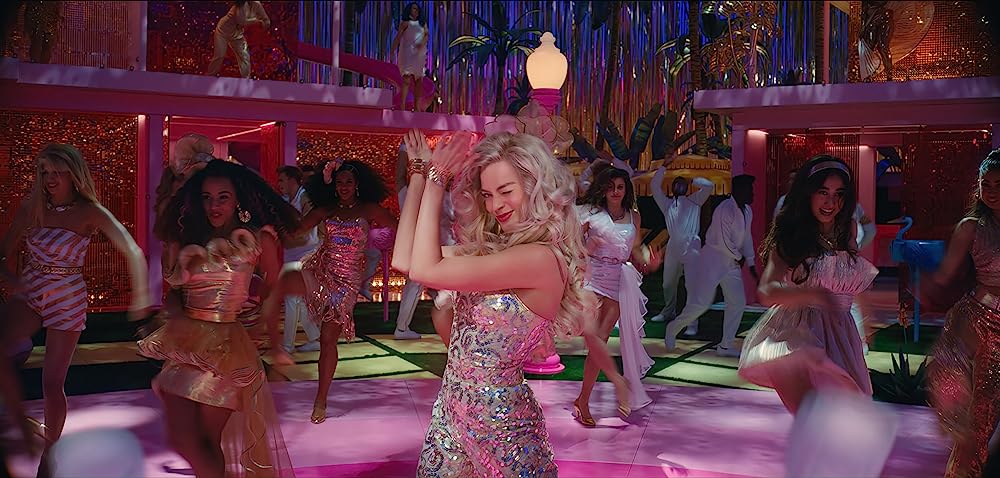Editor’s note: This article includes spoilers.
Director Greta Gerwig’s Barbie wants to offer an aspirational portrait of womanhood available to every girl. Mattel’s wasp-waisted doll is a kaleidoscopic mirror. Don’t like what you see looking back at you? Spin the wheel, refocus the image, and surely amid the wide range of hairstyles, outfits, professions, and, as of 2016, body shapes, there must be a Barbie that’s made for you.
But the film culminates in a narrow vision of womanhood—what it means to be a woman is simply being a target of misogyny. It’s a tidy answer, but it’s profoundly dissatisfying, suggesting there’s nothing good in being a woman (or a man, for that matter).
The film begins with verve, in a hyperstylized Barbie Land run by Barbies of every complexion and profession. Margot Robbie stars as “Stereotypical” Barbie. She doesn’t have as clear a job as President Barbie or Doctor Barbie, but she’s who you picture when you think of a “Barbie.” In her world, women run the show, while the Kens are on the same order of being as outfits, cars, and other accessories.
But Barbie’s idyllic world quickly frays. For no reason she can discern, her feet fall flat, her legs develop cellulite, and she interrupts her own party to ask, “Do you guys ever think about dying?” The problem is that the person playing with her in the real world is unhappy, and real world troubles are bleeding into Barbie Land.
To put things right, Barbie has to cross into our world and offer the joy and empowerment she’s designed to inspire. “Beach” Ken (Ryan Gosling) tags along, and they discover that the person playing with her isn’t a little girl. It was actually Gloria (America Ferrera), a Mattel employee and the mother of the sullen teenager Sasha (Ariana Greenblatt), who picked up Barbie in a sad and nostalgic mood. After a few side quests the four cross back into Barbie Land, but doing so causes the two worlds to get further ensnarled. Ken carries back the patriarchy and introduces it into Barbie Land like a new pandemic. (One human character explicitly compares the Barbies to Native Americans with no immunity to European disease.) The other Barbies who previously ran the show immediately give way to the Kens, catering to their desires and abasing themselves.
But the real world also brings a cure—a crash course in consciousness-raising delivered by Gloria. She gives a weary, four-minute monologue on the double bind of womanhood. “You have to be thin, but not too thin. And you can never say you want to be thin. You have to say you want to be healthy, but also you have to be thin,” she begins, before enumerating the conflicting demands women face at home, work, and simply as bystanders in public spaces. Gloria comes off as the Betty Friedan of the film, giving voice to the problem without a name. She offers her lecture on the impossibility of being a woman to each brainwashed Barbie in turn, like an ideological inoculation, and her frustration and exhaustion call them all back to themselves.
The message resonated with Hari Nef, a transgender actress who plays Doctor Barbie. In an Instagram post promoting the film, Nef said that the experience of being a woman badly is the most universal experience of womanhood. Nef and a group of transgender friends call themselves “the dolls” because, as Nef explained, “underneath the word ‘doll’ is the shape of a woman who is not quite a woman—recognizable as such, but still a fake.”
As Gloria gave her cold-shower pep talk, telling Barbie after Barbie it’s impossible to be a woman, I wondered if the transgender theorist Andrea Long Chu had a writing credit. (No.) In Females, Chu argues that everyone is female, because Chu defines femaleness as “a universal sex defined by self-negation.” “Put more simply,” Chu writes, “Everyone is female, and everyone hates it.”
Under this typology, the film’s star female is not Barbie but Ken. And he hates it. Promotional posters leading up to the movie’s release proclaimed, “She’s everything. He’s just Ken.” He orbits Barbie, but is never more than her accessory. As the film’s narrator (Helen Mirren) explains, “Barbie has a great day every day, but Ken only has a great day if Barbie looks at him.”
When Ken reads up on patriarchy (and horses) in the real world, he doesn’t grab Chu’s book. If he had, he’d certainly have identified with this passage: “To be female is to let someone else do your desiring for you, at your own expense. This means that femaleness, while it hurts only sometimes, is always bad for you.” Ken wants out, and that means finding someone to place below himself.
That’s not the conclusion Mattel Films, one of the production companies for Barbie, would want. Like the TV show The Good Place and Pixar’s 2020 movie Soul, Barbie concludes by taking on the big question (explicitly named by Billie Ellish in her ballad on the Barbie soundtrack): “What Was I Made For?” But it’s too touchy a question to answer in a four-quadrant movie. So Gerwig punts. In lieu of offering a positive vision of being female, the film lavishes praise on the pursuit of meaning, while any discovery of meaning is excluded.
All Barbies and Kens, except for the leads, settle back into their old lives. Ken is cut loose—excuse me, set free—by Barbie, who instructs him to figure out who he is without her. “Maybe all the things that you thought made you you aren’t really you,” she tells him gently. There’s no fixed point for him to start from, just a blank page and the chance to follow Justice Anthony Kennedy’s advice to “define one’s own concept of existence, of meaning of the universe, and of the mystery of human life.”
Barbie receives her own benediction from the film’s Higher Power—the ghost of Ruth Handler, the real-life creator of the doll. Barbie wants to be her own storyteller, rather than a conduit through whom stories are told. She looks to Handler for permission to become human, but Handler disclaims any authority over her creation. Barbie can decide who to be alone without anyone else’s input. Gerwig noted in interviews that she tried to have a touch between Handler and Barbie mirror Michelangelo’s “The Creation of Adam.” But here, the Creator is one more person stepping back to avoid being a barrier to the pursuit of the Self.
In the movie’s final scene, Barbie nervously awaits outside an office in the real world. With encouragement from Gloria and Sasha, she heads in and gently gets a receptionist’s attention. Is she staking out her place in the real world by applying for a job? Enrolling in school? Not quite. “I’m here to see my gynecologist!” Barbie says, and the screen cuts to credits.
It’s a jarring and cheap way to end the movie. Now that Barbie is real in this way, has she come to the doctor to restore the sterility she possessed as a doll? The rallying cries of a post-Roe world suggest that a woman’s freedom depends on access to an off-switch for her fertility. If Barbie is hoping for the children her embodiment could offer her, a man is more necessary than a GYN.
And so the film never offers a positive, contrasting vision to Gloria or to Chu. For Barbie, the gaze of the Other is too exhausting, too exploitative to be endured. Moreover, the vision of motherhood that Handler offers Barbie is itself a kind of self-negation. “We mothers stand still, so our daughters can look back to see how far they’ve come,” she says. It’s a perpetual relay race, with no teleological destination in sight.
I’m left awaiting Mattel’s next tie-in product: Sisyphus Barbie, complete with a hot-pink rock representing the weight of internalized misogyny. She’s ever struggling, always happy.







Please note that we at The Dispatch hold ourselves, our work, and our commenters to a higher standard than other places on the internet. We welcome comments that foster genuine debate or discussion—including comments critical of us or our work—but responses that include ad hominem attacks on fellow Dispatch members or are intended to stoke fear and anger may be moderated.
With your membership, you only have the ability to comment on The Morning Dispatch articles. Consider upgrading to join the conversation everywhere.